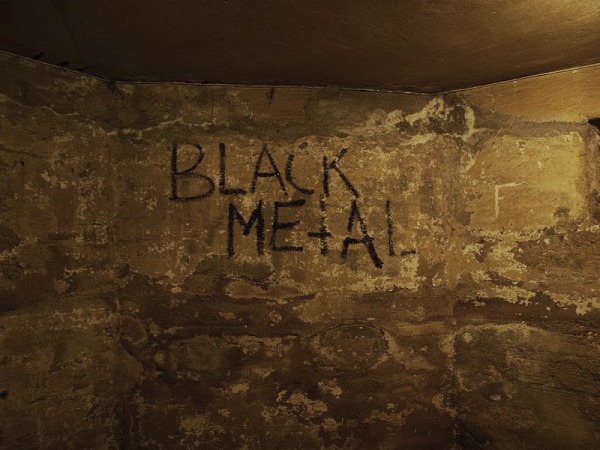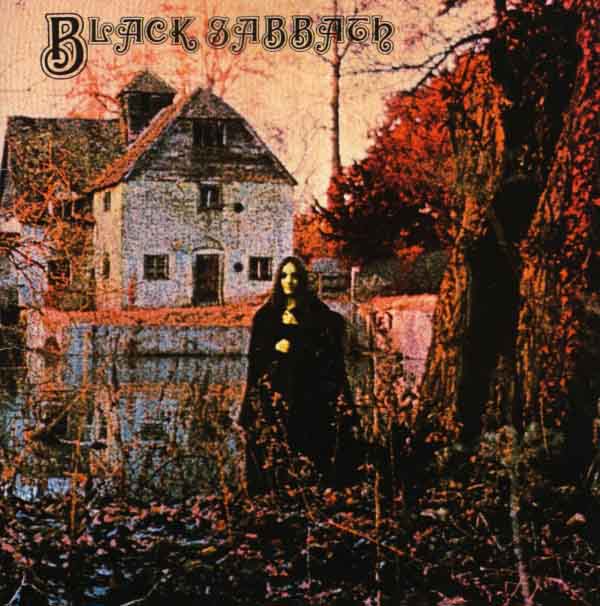Yesterday’s post on Romanticism reminded me of how long the Death Metal Underground has been making the comparison between Romanticism and heavy metal. The Heavy Metal FAQ has mentioned this association since its formulation in the early 1990s, but before that, it was written on the early versions of this website.
We continue to write about it because the linkage is and always has been inevitable, although it is clearest from literature — such as Edgar Allen Poe, H.P. Lovecraft, Robert E. Howard, Mary Shelley, Bram Stoker, Samuel Taylor Coleridge, William Blake and John Milton — that the metaphorical comparison can be made. On a subtler level, one can find connections between Romantic imagery in every generation of classical music, including the “Romantic era” which produced Franz Berwald, Niccolo Paganini and Franz Schubert in addition to the oft-mentioned Beethoven.
Our writers have highlighted the relationship between Romanticism and Satan, and the meaning of black metal, the linkage between Romanticism and mythic imagination, early black metal and Romanticism, and the relationship between Blake, Goethe and black metal. The connection has been clear from the get-go, when the Miltonic language of Slayer such as “to reign in Hell” made it clear that this genre had origins in the Romantic canon, as if the Gothic-cum-psychedelia of the self-titled Black Sabbath album did not:
While it has taken them over two decades to catch up, others have started to wake up to the heavy metal-Romanticism connection:
But “beneath all the grim vibes of Black Metal,” Hunt-Hendrix insists, “there’s this kind of spiritual ecstasy.” The tremolo picking creates the effect of “a string orchestra.” The great “unacknowledged influence” of the genre? Nineteenth century Romanticism.
…Byron, as did many other Romantics, courted what scholars have since come to refer to as “Satanic aesthetics,” a rebellious and sinister dandyism that manifested not only in their artistic creations but also in their personalities. Romantic violinist Niccolo Paganini–whose successor Franz Lizst maintained an “unbelievable” yet strictly heterosexual “passion” for fellow-heartthrob Byron—was rumored to have perfected his musical technique while imprisoned for the murder of his mistress, a skein of whose intestine had been repurposed as his G-string. The bejeweled and frequently open-shirted Bryon was the pointed inspiration for Lord Ruthven in John Polidori’s The Vampyre (1819), whose “Byronic look” was marked by “the curl of the upper lip, and the scowl of the brow.”
Black Metal, of course, has a penchant for Satanic aesthetics as well. In the hooded, sword-wielding visage of Rob Darken of Poland’s National-Socialist-leaning Graveland we see a medieval specter worthy of Horace Walpole’s The Castle of Otranto (1764), or one that might have been conceived during the famous 1816 idyll of Byron, Polidori, and the Shelleys on Lake Geneva, which ultimately yielded Mary Shelley’s Frankenstein, or The Modern Prometheus.
Much of the resistance to this idea comes from metalheads who wish to believe that their genre is sui generis, a term popular among hipsters used to mean “unique” in the sense of a style of yarn-bombing that no one else in Williamsburg thought of, and having the genre related to Romanticism diminishes its uniqueness. Others fear entryism if metal is associated with any other movement, hence the high hostility of metal to politics and organized religion entering its ranks (in addition to generalized hostility to feel-good illusions, of which organized religion is often considered one). Still others rage at the thought of heavy metal having anything “artistic” to it, and yet another group opposes this idea because it wants to find sociological (i.e. unconscious to the participants) motivations behind metal, not artistic ones which show some degree of alertness by the participants.
Among those who do investigate the link between Romanticism and metal, many look into the German writers. After all, DRI named an album after a Herman Hesse novel, and the term “heavy metal” was partially popularized by a band who took their name from another one of his works. Alistair McCartney, in The End of the World Book, writes about the connection between death metal and Romanticism:
Back in the late 20th century, specifically in the decades that have come to be known as the 1980s and 1990s, it seemed that every other day, teenage boys, tired of the sturm und drang of adolescence and inspired by the death-positive lyrics of so-called death-metal bands, were taking their own lives in very violent ways, which, according to sociologists, was typical of young men: a gun in the mouth and a car over a cliff were the preferred modes of suicide.
We can see these young North American men who were infatuated with death as direct descendants of the young European men, who, in the late eighteenth century, read Johann Wolfgang von Goethe’s novel The Sorrows of Young Werther, which ends with the lovesick hero with the supremely heavy heart taking his own life. Upon its publication in 1774, the book inspired two crazes on the continent: one for wearing blue coats, just like the coat the moody Werther wears; and one for suicide.
In this sense, although the first death-metal album did not technically appear on the horizon until 1985, with the release of Seven Churches by the band Possessed, this genre or subdivision of heavy metal was already getting slowly underway in 1772 when the then twenty-three-year-old Goethe, in residency at the Court at Wetzlar and fresh from a failed love affair, began writing the book to ease his own heavy heart.
…Historians argue that death metal’s popularity peaked in 1994. Similarly, not quite as many fans of death metal are taking their own lives — historians argue that this trend also peaked in 1994.
However, it seems the connection between Romanticism and metal is gaining momentum in the mainstream discourse. The bigger question is where we go from this point of realization. Romanticism was itself a reaction to the Enlightenment, and German Idealism a reaction to the reaction. History seems to be dancing around some idea it cannot quite get a handle on, and balances this with eternal sentiments like those of the Romantics: ideas that appear wherever society is “too much with us” and the individual is squeezed out by judgment of the herd.
Tags: Black Metal, Heavy Metal, heavy metal academics, Romanticism




That’s the defining characteristic of metal that, in all its inbreeding with punk, rock n roll and whatever else, ultimately always distinguishes it from those genres: sturm und drang. It’s a rare modern music genre that doesn’t see power and masculinity as something to be feared or ashamed of. Naturally, our feminized modern society deems it “cheesy” and childish. This is why any metal that NPR approves of can be safely ignored.
The history of mankind has always included struggle; the struggle to survive. In the past more so than today. Some people must have been meant to be borne into struggle; they who succeed because life for them represents nothing but a preoccupation to survive and that is how they best function and pass on their genes.
Now that surviving has becoming very easy, survival is no longer a preoccupation and life is comfortable. What becomes of those who are predetermined to be unfulfilled and bored with a life that does not include struggle? In my view the most capable of this kind become the romantics – the Beethovens, Vikerneses and Lovecrafts. Others play sports or join a military. Some end up depressed and kill themselves. Some get through the difficult period of adolescence and early adulthood, find a job and some close friends and gradually become acquainted with a strange reality.
Or is that just a fanciful dialectic?
Not fanciful by any means. I could see, had fate pivoted at any time during my teenage years, myself moving down any one of the paths you mentioned (sports, military, suicide, just anything besides boredom and pointlessness). Fortunately I struck a balance but probably not everyone has the opportunity that I do. Thus, music and art. I’m sure many of us are in the same boat, if en route to different destinations. Interesting thoughts; thanks.
False teleology: Nothing “must have been meant”.
+
reductive readings of ‘struggle’
+
how is people whose life is a mere preoccupation with survival necessarily a struggling one? (think of babies)
Thanks for refining and improving my argument. I hope it makes more sense for you now.
Between the bushes we stared
At those who reminded us of another age
And told that hope was away
Forever…
We heard elvensong and
Water that trickled
What once was is now
Away
All the blood…
All the longing and pain that
Ruled
Are away…
Forever…
We are not dead…
We have never lived
Ultimate expression of German Romanticism: Atrocity’s Todessehnsucht.
Heard that album mentioned twice in the comments section recently. Going to look it up and give it a listen now. Pretty old album so I doubt I’ll be able to pick up a CD, unfortunately.
Check out Fleshcrawl’s debut Descend Into the Absurd also for the best of German death metal.
Also first Morgoth EP.
Well, I’d add Torchure and Lemming Project and we have a best of German Death Metal list. Probably Dark Millennium and Eternal Dirge debuts for some.
Although it’s not death metal per se, perhaps Blood and the first demos from Kreator and Destruction, the Sodom demos and maybe Persecution Mania for relevance?
Early Incubator are okay, Cemetery (not the swedish band) are pretty good. I also like Golem, but most of the DMU readers won’t like them because they have a huge “Necroticism” influence.
Blood has a pretty solid discography! The others are more in the proto-death/black vein I guess? Definitely relevant though. Something like Poison(GER) perhaps? Or R.U.Dead? for a more 90s extension of that band.
That is a good one. If that’s the best DM out of Germany then I’m okay with that.
The album’s very worth picking up, one of the best, and the CD is available for inexpensive prices on Amazon.
direct descendants of the young European men are so hot. Ifeel so hot in my pants right now.
I always suspected that the comments on this site were nothing but a bear hookup for heshers. So it goes.
yeah. for the humanity. mmmh…
so what are u doin´tonight brett ?
Gettin’ swole, hangin’ at the Ripcord and listening to Cannibal Corpse, of course!
G’day. Feel free to give it a burl till tiny midget anally rapes everybody at first sparrows fart, mate.
*Cannabis Corpse ftfy.
A unique mix of Pantera, Opeth, Internal Bleeding, Cradle of Filth, Six Feet Under, Dimmu Borgir, Nasum, Deafheaven and Cryptopsy (plus the newest Gorguts).
I’m typing this on a MacBook Air.
Such open-minded and unbiased taste.
Maybe you should get some nice breathable mesh shorts. You can get them with a cool brutal/tech-core band name printed on the butt.
Brett is too cute with his humor
on the first light of the fifth day, look east for metal’s return